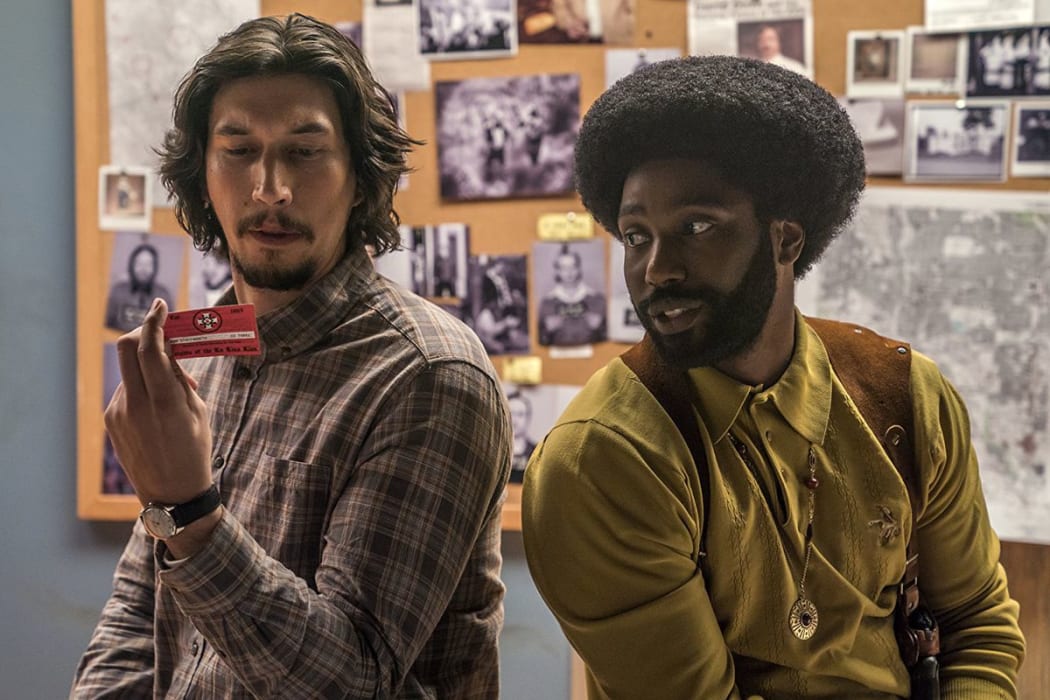The buzz leading up to a film called BlacKkKlansman has been palpable – partly because of its premise, the true story of a black policeman who joined the Ku Klux Klan, and partly because it’s been so long since we’ve seen a film from its director – what he calls a “Spike Lee joint”.

Adam Driver and John David Washington. Photo: Supplied
Spike Lee kicked off his career with colourful, aggressively political films like Do the right thing, Malcolm X and Mo’ better blues.
But, despite his prolific workload, his films have mostly been sidetracked, or sent to cable-TV for over 10 years. Until now.
The first thing you see in Black Klansman – and I urge you to see it – is the confidence with which it’s been made.
The notices have mostly dwelt on the subject matter – the place of the KKK in the US back in the Seventies and now – and the attitude – Lee’s fire and fury at Donald Trump’s America.
But that overlooks Lee’s power and skill as a film-maker.
The story opens in whitest Colorado in the Seventies – Lee fudges the precise date – where a young black police officer applies for a job in Columbus Springs. The times are definitely a-changing.
Ron Stallworth cools his heels in the records department, and hates it. He applies for a job as a plain-clothes detective and is assigned to go undercover at a public address by Black Power activist Stokely Carmichael.
Which is where he meets student leader Patrice.
Fresh from his first undercover mission, Ron’s eye is caught by an ad in the local paper offering information about ultra-racist organization the Ku Klux Klan.
On a whim he rings them and makes contact with the notorious David Duke.
Ron is invited to come along to a meeting of the local chapter of the Klan, and sees an opportunity to investigate them.
But to do that he’ll need a white front man. He enlists the help of a Jewish colleague, Flip Zimmerman, played by Adam Driver.
The story is almost too Hollywood-perfect to be true.
But while Lee and his writers have made some adjustments to the time line, it seems some of the most unlikely parts of Black Klansman – including David Duke urging Ron to run for KKK office – are absolutely what happened.
Ron is played by one John David Washington – you may know his Dad, Denzel. And he’s wonderful, whether he’s doing bored kung-fu moves in his office, flirting with the cop-hating Patrice, or doing white impressions on the phone to the oblivious Klan members.
Setting the tone is another of Lee’s skills.
For all the seriousness of the subject-matter – racism in America, and the real danger Ellworth and Zimmerman put themselves in – Lee mostly plays it like an entertaining Elmore Leonard crime novel – car chases, dry comedy and colourful characters.
But at the end it changes. Because Lee wants to underline the fact that this isn’t ancient history, back in the quaint old days of 40 years ago.
It’s now, and the ironic cracks about how America would never elect a Klan member are undercut by recent footage from Charlottesville, Virginia.
Like Ken Loach in Britain, Spike Lee isn’t just politically passionate, he’s a brilliant film-maker, first and foremost.
And he may tweak the details for dramatic effect, but never the truth of what America was, and is like for that country’s black community.
In other words, Lee’s back, and about damn time. And it’s a handy reminder to look back over Lee’s back catalogue. We’re unlikely to run out anytime soon – there are over 80 titles in there!

